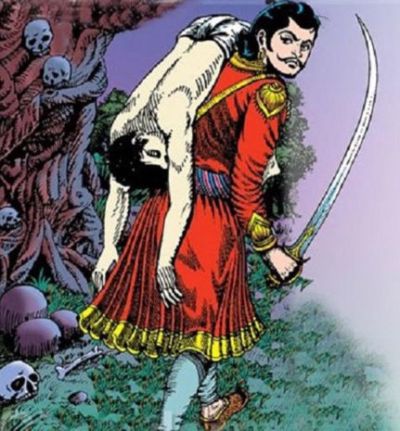Read the previous part here…
“My dear king, why are you so disturbed? You are the king of this city – you can take her for yourself any time you want!”
But Yaśodhana was a righteous king, and he refused to agree to such terms.
In the meanwhile, Baladhara, the commander-in-chief, and Unmādinī’s husband, heard of the king’s plight, and being a true loyal servant of the king, rushed to him, and falling at his feet, said…

दासस्त्री तव दास्य् एव सा देव न पराङ्गना ।
स्वयं चाहं प्रयच्छामि तद् भार्यां स्वीकुरुष्व मे ॥ १२,२४.३६ ॥
अथवा तां त्यजामीह देव देवकुले ततः ।
न दोषो ग्रहणे तस्यास् तव देवकुलस्त्रियः ॥ १२,२४.३७ ॥
इति स्वसेनापतिना निर्बन्धेन स पार्थिवः ।
तेनानुनाथ्यमानो ऽपि सान्तःकोपम् उवाच तम् ॥ १२,२४.३८ ॥
राजा भूत्वा कथं कुर्याम् अधर्मम् अहम् ईदृशम् ।
मय्य् उल्लङ्घितमर्यादे को हि तिष्ठेत् स्ववर्त्मनि ॥ १२,२४.३९ ॥
भक्तो ऽपि च भवान् पापे नियोजयति मां कथम् ।
परलोकमहादुःखहेतौ क्षणसुखावहे ॥ १२,२४.४० ॥
न क्षमिष्ये च ते धर्म्यान् दारान् यदि विहास्यसि ।
सहते मादृशः को हि तादृशं धर्मविप्लवम् ॥ १२,२४.४१ ॥
तद् वरं मृत्युर् इत्य् उक्त्वा स राजा निषिषेध तम् ।
त्यजन्त्य् उत्तमसत्त्वा हि प्राणान् अपि न सत्पथम् ॥ १२,२४.४२ ॥
तथैवार्थयमानांश् च पौरजानपदान् अपि ।
मिलितान् स निराचक्रे राजा सुदृढनिश्चयः ॥ १२,२४.४३ ॥
ततः क्रमेण तेनैव स्मरज्वरभरोष्मणा ।
प्रक्षीणदेहः प्रययौ स यशःशेषतां नृपः ॥ १२,२४.४४ ॥
सेनापतिश् चासहिष्णुस् तं तथा प्रमयं प्रभोः ।
सो ऽग्निं विवेश भक्तानाम् अनिर्वाच्यं हि चेष्टितम् ॥ १२,२४.४५ ॥
“My king, you should consider her the wife of your slave, and hence a slave as well. She is not another’s wife, but a part of your possessions.”
“And I offer her to you, please accept her. Else, I will abandon her at the temple, so that you can take her into your refuge.”
When Baladhara said this, the king retorted angrily…
“Being your king, how can I even think of such unrighteousness? I am supposed to set an example, if I myself do not follow Dharma, then who will?”
“And how can you, one who claims to be so devoted to me, encourage me to commit such a ghastly crime, just for a moment’s pleasure, knowing very well that it will cause great misery in many janmās?”
“And, if you desert your loyal wife, I will personally ensure that you crime does not go unpunished, for which king in my position would be able to tolerate such injustice? It is better that I die before any of this happens!”
And so king Yaśodhana sent away Baladhara. It is rightly said…
त्यजन्त्य् उत्तमसत्त्वा हि प्राणान् अपि न सत्पथम्
Men of noble character would rather give up their lives, than abandon the path of Dharma.
And Yaśodhana refused to relent even when his other subjects pleased with him to accept Baladhara’s proposal.
In a few months, the king’s body was gradually consumed by the fever of his love, and soon, only his name and fame remained. He passed away less than six months after the incident.
Baladhara too could not bear the thought that the king’s death had come about in this manner, and he too gave up his life, for it is said…
भक्तानाम् अनिर्वाच्यं हि चेष्टितम्
The actions of devoted followers cannot be explained in mere words.
इत्य् आख्यातकथाश्चर्यो वेतालो ऽंसस्थितस् तदा ।
स त्रिविक्रमसेनं तं भूयः पप्रच्छ पार्थिवम् ॥ १२,२४.४६ ॥
तद् एतयोः को नृपतेः सेनापतिमहीभृतोः ।
सत्त्वेनाभ्यधिको ब्रूहि पूर्वोक्तः समयश् च ते ॥ १२,२४.४७ ॥
The Vetāla finished his story, and then addressed King Vikram and said…
“So tell me, o King, who was more noble, Yaśodhana or Baladhara? Who was more praiseworthy?
“Remember, if you know the answer, and don’t tell me the truth, your head will burst into a hundred pieces!“
King Vikram replied…
to be continued…
